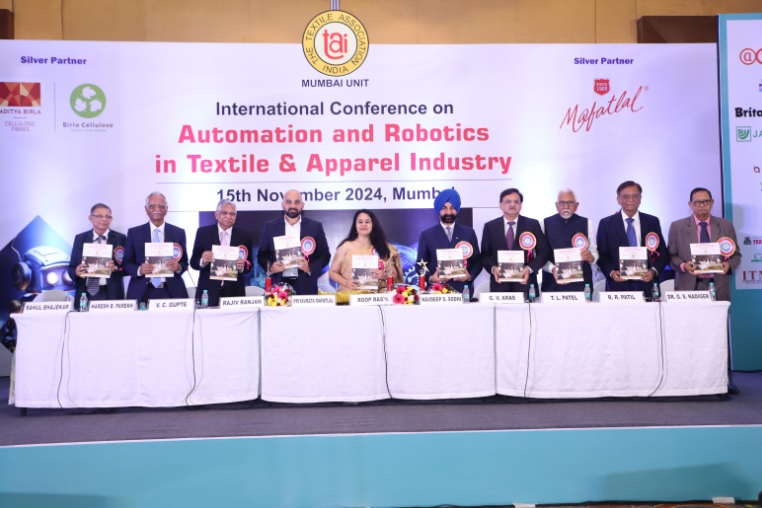
The Textile Association (India), Mumbai Unit, hosted an International Conference on Automation and Robotics in the Textile & Apparel Industry on November 15, 2024, at The Lalit, Mumbai. This event brought together leading professionals, policymakers, and technology experts to explore the potential of automation in transforming India’s textile sector. Over 350 delegates, including industry leaders and academic professionals, attended the conference, underscoring its significance in driving innovation.
Focus on automation and robotics
The conference revolved around the theme of leveraging automation and robotics to enhance productivity, reduce costs, and improve global competitiveness. With India’s textile industry facing challenges like rising labor costs, inefficiency, and increased competition, automation has emerged as a strategic imperative.
Roop Rashi, Textile Commissioner, inaugurated the event as the Chief Guest. In her keynote address, she emphasized the critical role of automation in achieving higher productivity, cost savings, and sustainable growth. She highlighted that the government is actively supporting initiatives to modernize the industry, thereby encouraging the adoption of advanced technologies.
Keynote session: Global perspectives
Navdeep S Sodhi, Partner at GherziTextil Organisation, delivered the keynote address. He presented an in-depth analysis of the global landscape, stressing how automation could enable Indian textile manufacturers to compete with global leaders. According to Sodhi, automation is no longer a luxury but a necessity for companies looking to thrive in an increasingly competitive market.
He outlined the importance of integrating artificial intelligence (AI) and robotics to optimize supply chains, reduce waste, and enhance product quality. His insights were complemented by case studies from international markets where automation has yielded significant productivity gains.
An important highlight of the event was the Industrial Excellence Award, presented to Pradeep Dodhia, Managing Director of Dodhia Synthetics Ltd. This prestigious award recognized his outstanding contributions to the textile industry, particularly in adopting innovative practices that have set benchmarks for others. Dodhia’s efforts in integrating modern technologies into his company’s operations were applauded by the audience.
Technical sessions: Insights into innovation
The first technical session delved into various facets of automation in textile manufacturing, emphasizing predictive maintenance through AI-based solutions, waste management technologies aimed at enhancing sustainability, and process optimization tools designed to streamline production and improve efficiency.
Presentations from experts detailed how predictive maintenance systems can foresee equipment failures, thus minimizing downtime and saving costs. Speakers also highlighted innovative waste management solutions that align with the industry’s growing focus on sustainability.
The second session spotlighted advancements in storage automation and warehouse management systems, innovations in digital printing technologies, and upgrades in textile machinery integrating robotic systems. It also explored IT solutions for supply chain management and real-time monitoring, highlighting their role in enhancing operational efficiency.
This session emphasized the growing role of digital printing and smart warehouses, enabling faster turnaround times and better inventory control. Presentations demonstrated how robotic systems are reducing human intervention in complex manufacturing processes, thereby increasing precision and efficiency.
Expert panel discussion
A notable feature of the event was a panel discussion moderated by Rajiv Ranjan, an industry expert with extensive knowledge of automation trends. The discussion delved into the challenges of adopting automation in India, including high initial costs and the need for skilled labor. Panelists also explored solutions to bridge these gaps, such as government incentives and training programs.
The panelists agreed that while automation presents certain challenges, the long-term benefits far outweigh the costs. They stressed that Indian textile companies must embrace these technologies to remain competitive in global markets.
Key takeaways and future outlook
The conference concluded with a consensus that automation and robotics will be pivotal in shaping the future of India’s textile and apparel industry. Delegates left with actionable insights into integrating these technologies into their operations.
TAI Mumbai’s initiative to organize this event reflects its commitment to fostering innovation and knowledge sharing within the industry. With the successful conclusion of this conference, the textile sector is poised to take significant strides toward a more automated and efficient future.












